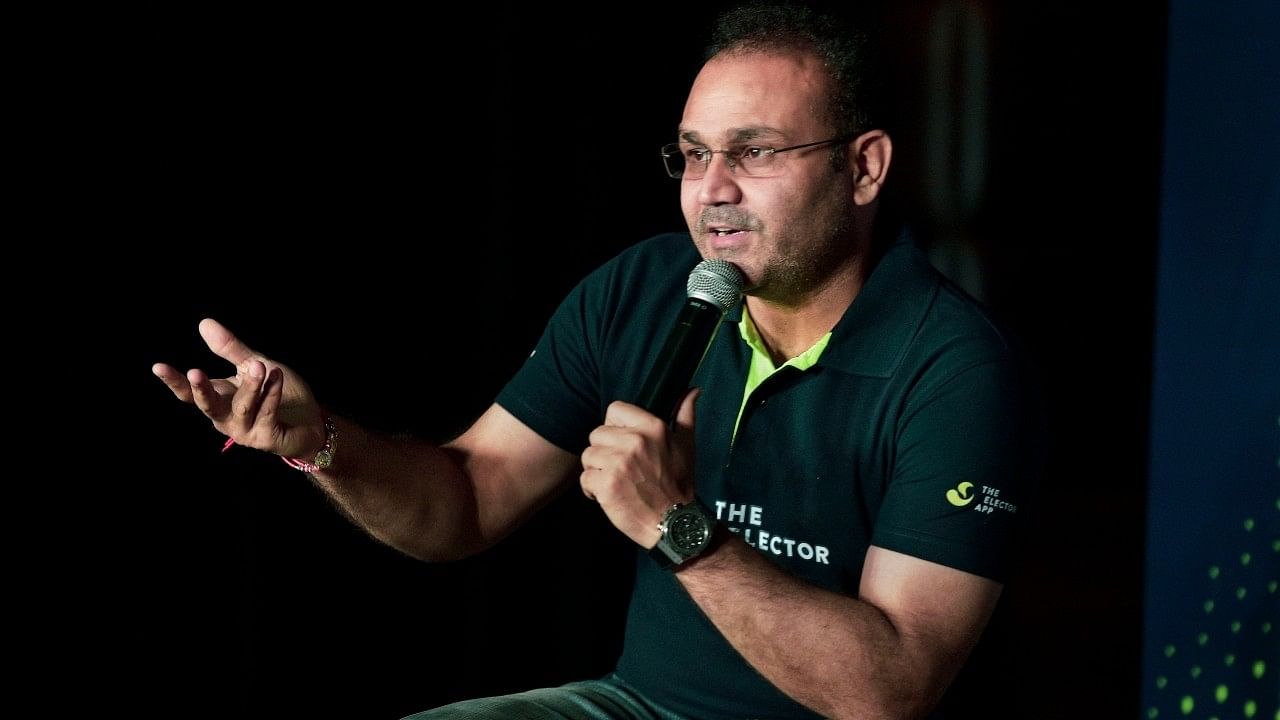
Legendary India opener Virender Sehwag
Credit: PTI Photo
Dubai: Former captain Diana Edulji on Monday became the first Indian woman cricketer to be inducted into the ICC Hall of Fame.
Legendary India opener Virender Sehwag and Sri Lankan World Cup winner Aravinda de Silva were also made members of ICC Hall of Fame for their stellar achievements during their playing career.
A trailblazer in women's cricket, Edulji made just as big an impact on the field during her playing days when captain of India as she did as an administrator after her playing career.
“It indeed is a great honour to be the first Indian Women Cricketer to be inducted and join a galaxy of cricketers, male and female from across the world,' the 67-year-old said in an ICC release.
She played 54 matches for India across three decades (between 1976 and 1993) and made her mark as a slow left-arm orthodox spinner taking more than 100 wickets.
Edulji played 20 Tests, scoring 404 runs, and taking 63 wickets at an average of 25.77.
From 34 ODIs, she scored 211 runs, and bagged 46 wickets at an average of 16.84.
But, it is perhaps off the field that Edulji has had an even greater impact, having played a major role as a trailblazer for India’s women’s cricketers for many decades.
In her role as administrator with Western Railways, Edulji worked hard to increase employment opportunities for talented female cricketers in India, and helped shape the sports policy of Western and Indian Railways.
One of the most destructive batters of the modern era, Sehwag donned India colours between 1999 and 2013.
Sehwag scored a total of 23 Test centuries during his illustrious career -- the fifth most by an India men's player.
His highest score of 319 against South Africa in Chennai in 2008 the best of any Indian player ever.
He accumulated 8,586 runs from 104 Tests at an average of 49.34. He also took 40 wickets during his Test career which spanned from 2001-2013.
But it wasn't just against the red-ball that Sehwag thrived, with the dynamic right-hander just as effective against the white-ball with an equally imposing record at ODI level.
The batter from Delhi, now 45, totalled 8,273 runs for India in 50-over cricket at an average of 35.05 and his 219 against the West Indies in Indore in 2011 remains the third-highest score achieved by a male cricketer in ODI.
He also has 96 wickets in his kitty from the 251 ODIs he played between 1999 and 2013.
Sehwag also played a pivotal role in helping India claim their second World Cup title in 2011, with his 380 runs for the tournament, the seventh-best for any player during the tournament.
In the 19 T20 Internationals he played, Sehwag scored 394 runs at an average of 21.88.
“I would like to thank the ICC and the jury for inducting me with this honour,' Sehwag said.
“I feel extremely grateful for having spent a great part of my life doing what I loved most, ‘hitting the cricket ball’,' he said.
A key member of Sri Lanka' 1996 World Cup-winning side, De Silva is an icon in the island country.
The consistent right-hander scored 20 Test centuries during a 19-year international career (1984 to 2003) -- the third most hundreds by any Sri Lanka men's player -- and was just as adept against the white-ball with another 11 centuries coming in 50-over cricket.
The most important of those was in the 1996 World Cup final, as de Silva almost single-handedly willed his side over the line against Australia with an unbeaten 107 not out in what was an unforgettable run chase.
A clever batter that always respected the situation of the game, the 58-year-old de Silva was an integral part in Sri Lanka's resurgence at the end of last century.
He accumulated 6,361 runs from 93 Tests at an average of 42.97. From 308 ODIs, he scored 9,284 runs at an average of 34.90 and took 106 wickets.